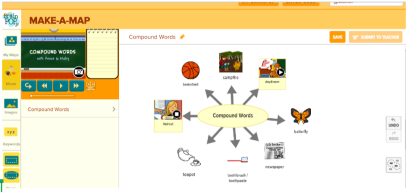Compound Word Lesson Plan: Scrapyard Slice
This lesson plan, adaptable for grades K-3, features a game that challenges students to identify and split up compound words.
Students will:
- Watch BrainPOP movies to learn about compound words.
- Use Make-a-Map to brainstorm compound words.
- Identify and split up compound words playing an interactive, online game.
- Explain compound word strategies.
- Create compound words from root words. (extension activity)
Materials:
- Computers or other devices with Internet access
- Interactive whiteboard
- Scrapyard Slice: SnapThought Prompts
- Index cards (extension activity)
- Beanbag (extension activity)
Preparation:
This lesson plan features the PBS Kids game Scrapyard Slice, a compound word game from our partner Sesame Workshop’s The Electric Company. In this game, the evil bots are trying to dump compound words into the junkyard. Players stop them by slicing the compound words into separate words.Preview and play Scrapyard Slice to plan how you will adapt it to your students’ needs. If students will be working in small groups, review tips on Setting Cooperative Gaming Expectations.
For ideas on how to use SnapThought with this game, read Scrapyard Slice: SnapThought Prompts for more information and specific SnapThought prompts to provide students during game play.
Build background knowledge or reinforce the topic with the BrainPOP Jr. movie Compound Words.
Lesson Procedure:
- Play the BrainPOP Jr. movie Compound Words on the whiteboard for the whole class without pausing.
- Next, divide the class into pairs and have them open the Make-a-Map feature on individual computers. (Note: If limited access to computers, pairs can do this step with paper and pencil). Instruct pairs watch the movie again within the Make-a-Map feature. As they watch, have them make a concept map of compound words mentioned in the movie. They can use images, words or clips from the movie. See below for an example. Suggest that they pause the movie as they create the concept maps.

- Project the game Scrapyard Slice on the whiteboard and invite students up to try and figure out the game mechanics, or how to play. You may want to demonstrate for younger students.
- Now have students play the game independently or with a partner. You may also play the game with a small group of students while the rest of the class plays it independently. Remind students of cooperative gaming expectations (see Preparation).
- If students have individual logins through My BrainPOP, encourage them to use the SnapThought® tool to take snapshots during game play, and reflect on their thinking and strategies. Review Scrapyard Slice: SnapThought Prompts for My BrainPOP for suggested prompts.
- Bring the class together to discuss their experience playing the game. What strategies did they use to determine if a word is a compound word or not.
Extension Activities:
Activity 1 Project the Talk About It activity and prompt students to brainstorm compound words for each of the words on the chart. Record students’ responses by typing directly into the page.Activity 2 Play a compound words game show in your classroom. Invite a volunteer to be the game show host. Give the host the Compound Root Word cards (see Preparation). Divide the rest of the class into two teams. The host picks a card from the stack, shows it to the teams and says it aloud. Teams have one minute to independently write as many compound words as they can make from that root word. For example, if the root word is rain, compound words may include rainbow, rainstorm, raincoat, etc. Teams should be in separate parts of the classroom so they can’t hear each other. After one minute, teams stop writing. Teams get a point for each legitimate word. An alternative way to play this game is for a contestant to come up from each team, and write the words independently.
Activity 3 Have the class form a circle. Holding the bean bag, say the first part of a compound word, such as butter and throw the bag to a student. The student adds a second half to the word, such as fly and says the compound word aloud: butterfly. Then the student throws the beanbag to another student, who say the first half of another compound word, and so on.











